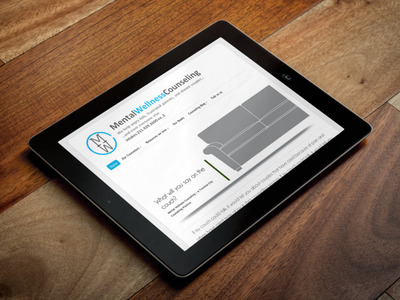Guest post by Daniel Wendler of MarketingForTherapists.org
The good news is that it’s extremely easy to launch a website for your therapy clinic.
The bad news is that it’s also easy to make mistakes when you design that website.
The great news? Give me five minutes, and I can teach you how to spot and fix the most common mistakes. Here we go!
Mistake One: Not Being Mobile-Friendly
Being mobile-friendly means that your website is designed to display properly on a mobile device. If your website is not mobile-friendly and a potential client visits it on their phone, your website will look very bad – and your potential client will look elsewhere for a therapist!
It’s easy to test if a website is mobile-friendly – just use Google’s free mobile-friendly tool. Of course, you can also pull out your phone and test your website yourself.
If your website is not mobile friendly and you are using WordPress, you can make it mobile-friendly by switching to a “responsive” theme (responsive is web-speak for mobile-friendly.) The WordPress official site has a long list of responsive themes, and a quick Google search for “responsive wordpress theme” will give you even more options. (If you’re not using WordPress, ask the customer support team of whatever service you are using for help.)
Mistake Two: Wasting space above the fold.
The “fold” is the part of your website that is visible without needing to scroll down. Potential clients use the area above the fold to form a first impression of your site, so it’s crucially important that you use this space well.
Unfortunately, many therapist websites offer little useful information above the fold. Instead of introducing clients to their practice or giving information about services that they offer, their entire area above the fold might be taken up by a large photo, cluttered design, or simply empty space.
In order to solve this problem, redesign your home page to grab clients’ attention above the fold. A simple solution is to have a quality photo, an attention grabbing headline, and a few short paragraphs that quickly describe who you are and what you offer. If you need an example, Front Range Counseling Center does a fantastic job of this.
Mistake Three: Slow Load Times
According to KISSmetrics, 40% of users will leave a website if it takes more than 3 seconds to load. That means if you have a slow website, you’re losing potential clients.
You can see how fast your website is by using the free service GTmetrix. Since load times vary, a good practice is to use GTmetrix a few times in a row, and then average the results to get your true load time.
If your website loads in three seconds or less, you’re doing great. If it’s loading in five seconds, you should think about speeding it up. And if your website takes more than five seconds to load, you are almost definitely losing clients.
If you’re using WordPress, you can speed up your site with a free “caching” plugin. Zencache is the easiest caching plugin to use, although if you have some technical know-how you might prefer WP Super Cache.
Making It Difficult For Clients To Book Sessions
If a client visits your website, they should know within six seconds how to book a session.
After all, the primary purpose of your website is to help clients book sessions. All of the information on your website, like your bio, your blog, and your articles – it all exists to bring you new clients.
Unfortunately, many therapist websites make it very difficult for clients to book a new session. Sometimes the “book a session” form is hidden in the Services page, or sometimes it’s buried at the bottom of the page.
Spare your clients the confusion, and make it easy for new clients to book a session with you. Have a button in your menu that is clearly labeled as “Book a Session.” When clients click the button, take them to a dedicated page that gives them all the information they need to book their first session.
Author Bio
 Daniel Wendler is a doctoral student in clinical psychology. Before pursuing a career in psychology, he worked as an online marketing consultant, and wrote a successful online social skills guide. Today, he combines his skills in psychology and marketing to help therapists market themselves online.
Daniel Wendler is a doctoral student in clinical psychology. Before pursuing a career in psychology, he worked as an online marketing consultant, and wrote a successful online social skills guide. Today, he combines his skills in psychology and marketing to help therapists market themselves online.
He’s passionate about sharing his marketing skills with the mental health community because when it’s easier for therapists to market themselves, it’s easier for people in need to find the right therapist. Read his free online marketing guide for therapists, and connect with him at DanielWendler.com.

